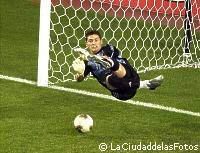German goal-line technology successfully tested at FIFA's U-17 world championships
A smartball being tested at the FIFA under-17 tournament could change the face of football by eradicating controversial goal-line decisions. Looking like any ordinary football, the smartball is fitted with a tiny microchip designed to help a referee decide whether or not the ball has crossed the line completely, and thus whether a goal has been scored. The technology can also be used to determine whether or not the ball has gone out of play. FIFA will make a final decision in October on using of goal-line technology at the 2006 World Cup in Germany. The smartball, trialled in four of the five stadiums staging the under-17 tournament, has proved accurate and popular, officials say. Günter Pfau, Adidas AG's manager for relations with FIFA, explained that the ball had performed well in almost a week of matches and the feedback from the referees, who are taking it as a tool, is forward-looking and positive. The bionic ball is the product of a collaborative effort between three partners: sports giant Adidas, 3D specialist Cairos Technologies and engineering specialists from the Fraunhofer Institute. The smartball is implanted with a 15 millimetre microchip that sends a radio signal when it crosses the line, as if it had touched an electric fence. The encrypted signal is relayed by up to 12 antennae in the corners of the pitch to a computer which sends a message to a watch worn on the referee's wrist - all in under one second. The message makes a virtually inaudible signal, and the referee need never use the technology, unless he or she is in doubt. If so, a quick glance at the watch will reveal the word 'goal', or no message, indicating no goal. Any goal messages are stored in the watch's memory with the time logged. So far, the ball has never lost contact while in play. According to a FIFA spokesman: 'Until now we've had very positive feedback,'. But he added that so far all goals had been clear-cut, and that there had been little need for electronic help. The smartball's signal cannot be disturbed by radios or mobile phones as it is encrypted and cannot be interrupted by hacking. FIFA president Sepp Blatter, traditionally a staunch opponent of technology, has backed the trial in Peru, and has said the ball can be used in Germany next year if it works.

